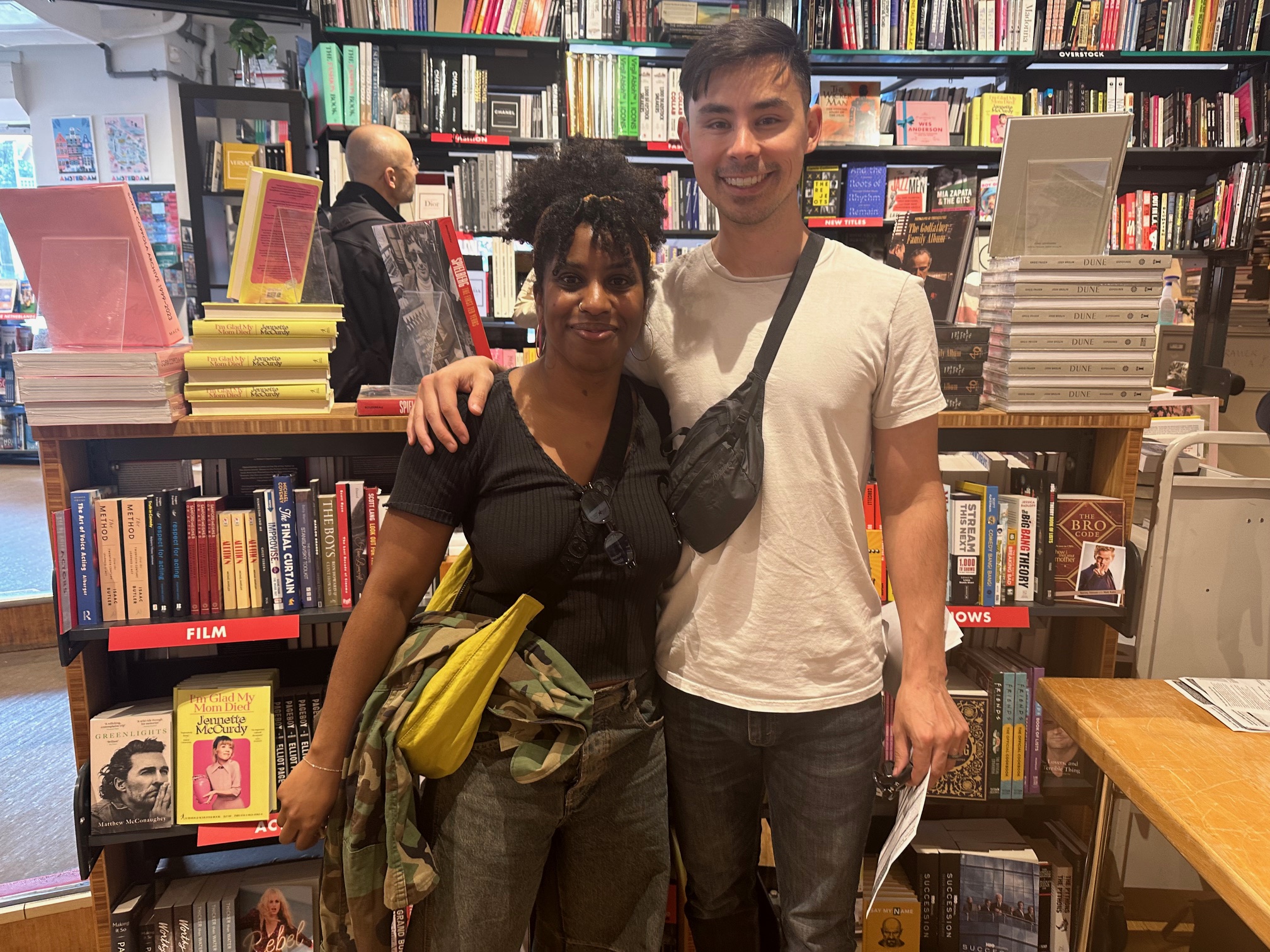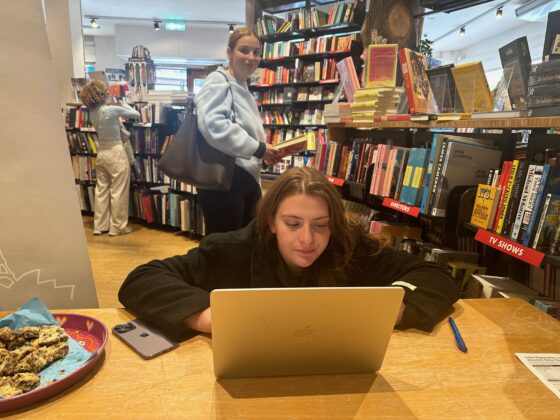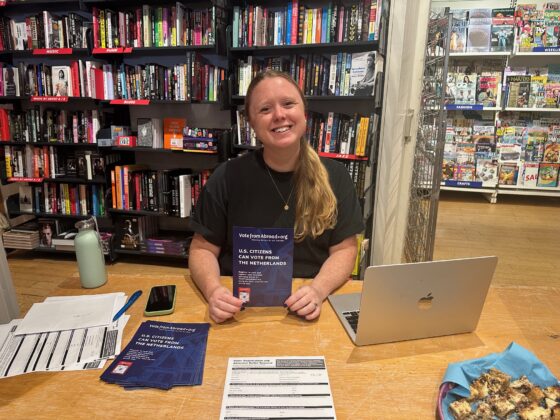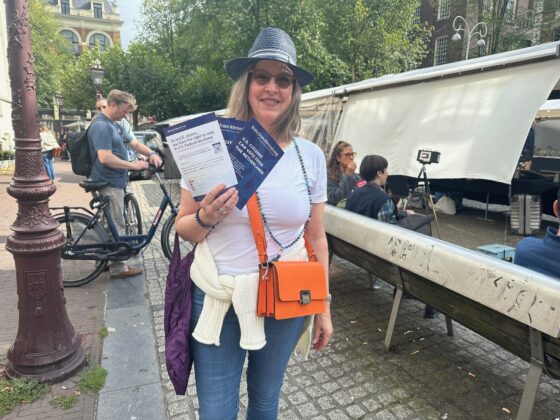Americans abroad are determined to cast their votes

The economy, stopping Trump, more information needed. These were some of the reasons why US citizens turned up at The American Book Center (ABC) in Amsterdam on Sunday to apply for their absentee ballots for November’s presidential elections. Lauren Comiteau went to see what else was on voters’ minds.
Oakland native and product marketing manager Kristin Van De Yar (35) moved with her husband to Amsterdam a little over a year ago for his work. This past Sunday, the couple came to ABC to register for their first absentee ballots in a US election with high stakes.
“I think just keeping our democratic process in place and making sure that we have someone in office who actually cares about the American people and the current issues there is really important,” says Van De Yar.
She’s also concerned about increasing prices for groceries, wants more protection for workers (such as her friends who are getting laid off) and, as a new international, wants someone in office who is “capable” of maintaining international alliances.
“We’ll be voting for Kamala Harris,” she says unequivocally. “I’m also from California, where she was Attorney General, so I’ve kind of seen her work, and to me, it just feels like a no-brainer to vote for someone like her. She’s really exciting to see.”
Van De Yar was one of a study stream of will-be voters who took advantage of voting drive to make the overseas voting process seamless. As was first time voter, 21-year-old college student, Emma.
“I don’t want Trump to become president because he thinks immigrants eat pets,” she says. “But seriously, I have a lot of concerns about Trump. I’m happy Kamala is a woman of colour, but my main concern is stopping Trump.”

Emma, a dual Dutch-American citizen, has been voting in Dutch elections since she was 18, but she’s excited about expanding her voting power. “I just think it’s important to vote, and I’m happy I have a vote in such a big country with so much power.”
Party politics
The registration drive was organized by Democrats Abroad, the official Democratic Party arm for Americans residing outside the US. There are some 5.7 million of them, 2.8 million of which are eligible voters, including military personnel.
And although the party seeks to elect Democratic candidates, it says its voter registration drives are open to people of all political stripes to provide them a “Democratic voice in our government.”
That includes undecided voters like Shawna McHenry from Oklahoma. She’s been living in Amsterdam for two years and wants to make sure she gets her ballot.
“My biggest concern right now is that nobody is really voicing their policies, so we’re not actually getting to hear from both sides,” she says. “It’d be nice to have another debate with the focus on that.”
Although Republicans Overseas represents Republicans abroad, it is a political organization similar, says the group, to a political action committee (PAC), whereas Democrats Abroad is recognized as a “state” Party by the Democratic National Committee.
“Democrats Abroad is considered a state within the Democratic Party,” says Audrey Tolbert, secretary of Democrats Abroad Netherlands. “It’s just the same as New York and Maryland and other states. We send delegates to the National Convention to elect the Democratic candidate for president. And because there are so many members of Democrats Abroad, we send a higher number of delegates to the Convention than a handful of states.”

In 2020 and 20024, Democrats Abroad sent 21 delegates to the Democratic National Convention (DNC), which is more than Wyoming (18), North Dakota (18) and Alaska (19) sent in 2020. It’s also more than the US territories of American Samoa and Guam, which have the fewest number of delegates (between 11 and 13).
“The Democrats are the only party that actually honours its American citizens abroad and allows them to participate in the caucus,” says longtime Amsterdam resident Seleen DeYarus from Colorado, who was a delegate at the International Democratic Caucus in Edinburgh in 2004, which chose the overseas delegates that headed to that year’s DNC to cast the overseas vote.

“There is no equivalent, and the Republicans have never allowed international representation at their convention. It’s another unsurprising attitude, and it’s unfortunate.”
Overseas votes count
Despite the perennial concerns from sceptical voters that overseas votes don’t count, Tolbert says that’s not true.
“The international vote can make the difference in a lot of cases,” she says. “We’ve seen that in past elections, especially in 2020. In a handful of counties, those absentee ballots were the ones that pushed certain counties over for Biden. In a tight election, it can really make a huge difference. Your vote counts just as much as any other Americans.”
“We know that in 2020, the overseas votes delivered the election win for president Biden in Georgia and in Arizona,” the chair of Democrats Abroad U.K., Kristin Wolfe, told CBS News earlier this year. “Without that, the election would not have potentially gone the way it did. So, we were the margin of victory.”
Overseas votes were critical to George W. Bush’s White House wine over Al Gore in 2000.
“The only thing I can do at this point is to vote, even though people feel it doesn’t really matter and what difference does it make,” says Maia, a professional who has been living in Amsterdam for the past six year.
“But the fact that people are trying to prevent other people from voting indicates that it’s important. People died for people like me to be able to vote. So I’m exercising the one right that I have. It’s a sense of empowerment, and if things don’t go the way I’d like them to, then I feel it gives me the right to complain,” says the native New Yorker.
Voter turnout
Tolbert says this time around, more people are likely registering to vote because they believe the election is crucial. “There’s been quite a shift in momentum since Kamala announced her candidacy,” she says. “I think that’s really energized a lot more people to get out and vote.”
When asked what issues are important to her, Maia says “everything”, including the electoral college. But it’s the state of America’s democracy that keeps her up at night.
“There are always differences of opinion, but this goes way beyond differences of opinion. This is total polarization. And from my perspective, that empire has already begun to decline. It’s one last little hope that maybe the great experiment will keep going and stay together, but I’m not so sure.”
First time voter
Fifty-five-year-old Judy from Haarlem is casting her first vote in an American election. Although she was born in the Netherlands, her father is American, “so I am American as well. I’m a typical American abroad!”
She’ll be sending in her ballot along with her brother and sister come November. “I think it’s more important than ever,” she says enthusiastically. “I’m not a great fan of Trump, to put it mildly.”
She’s concerned about institutional racism, about banks “and their freedom to make the rich richer”, and that “people who feel neglected or angry will vote from their belly instead of seeing who is really helping them like I think Kamala has done as a prosecutor. America has always been grown from people of every origin. And you should focus on what makes people alike, not what makes them different.”
She concedes some may question her right to vote in a nation in which she never lived, but she dismisses the argument. “I still have an American identity, American roots. My grandparents and great grandparents battled in wars. So, it’s the least I can do, and I’m just excited that I can have a really, really, really small part in this. It’s taken 55 years, but better late than never!”
Democrats Abroad will be holding more voter registration drives at ABC in The Hague if you want to request a ballot. You can also request one online through Vote from Abroad.
Thank you for donating to DutchNews.nl.
We could not provide the Dutch News service, and keep it free of charge, without the generous support of our readers. Your donations allow us to report on issues you tell us matter, and provide you with a summary of the most important Dutch news each day.
Make a donation